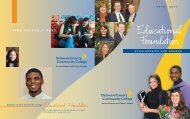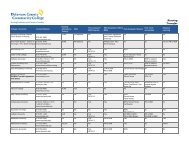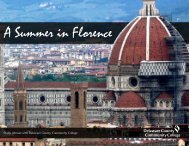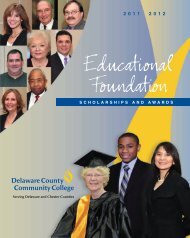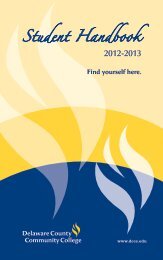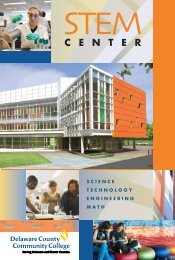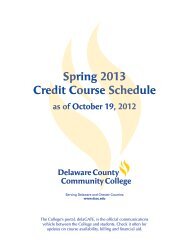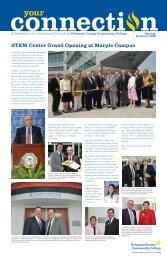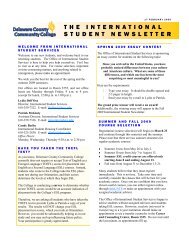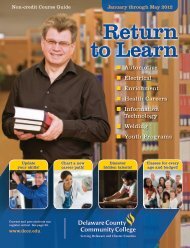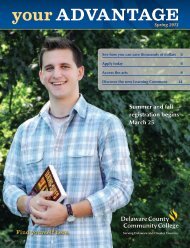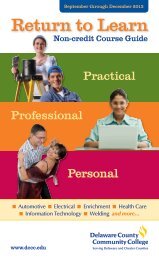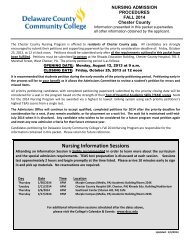2010 Catalog - Delaware County Community College
2010 Catalog - Delaware County Community College
2010 Catalog - Delaware County Community College
You also want an ePaper? Increase the reach of your titles
YUMPU automatically turns print PDFs into web optimized ePapers that Google loves.
COLLEGE AND UNIVERSITY TRANSFER PROGRAMS 29<br />
First Semester<br />
Credits<br />
ART 130 Drawing I………………………………... . . . . . . . . . . . . . . 3<br />
AR T 110 Art History I…………………………….. . . . . . . . . . . . . . . . 3<br />
ENG 100 English Composition I………………….... . . . . . . . . . . . . . . . 3<br />
GRA 121 Three-Dimensional Design………………. . . . . . . . . . . . . . . . 3<br />
GRA 122 Two-Dimensional Design………………. . . . . . . . . . . . . . . . . 3<br />
15<br />
Second Semester<br />
ART 111 Art History II…………………………….. . . . . . . . . . . . . . . 3<br />
ENG 112 English Composition II………………... . . . . . . . . . . . . . . . . . 3<br />
GRA 123 Color and Design………………………. . . . . . . . . . . . . . . . 3<br />
GRA 134 Drawing II……………………………..... . . . . . . . . . . . . . . 3<br />
_______ Social Science Elective…………………... . . . . . . . . . . . . . . . 3<br />
15<br />
Third Semester<br />
ART 140 Painting I………………………………… . . . . . . . . . . . . . 3<br />
ART 145 Watercolor Painting……………………... . . . . . . . . . . . . . . . 3<br />
______ Lab Science……………………………… . . . . . . . . . . . . . . 4<br />
MAT 120 Modern <strong>College</strong> Mathematics I………….. . . . . . . . . . . . . . . . . 3<br />
GRA 211 Digital Imaging (OR) . . . . . . . . . . . . . . . . . . . . . . . . .<br />
ART 160 Black and White Photography…………... . . . . . . . . . . . . . . . . 3<br />
16<br />
Fourth Semester<br />
ART 141 Painting II……………………………….... . . . . . . . . . . . . . 3<br />
ART 203 History of Modern Art (OR). . . . . . . . . . . . . . . . . . . . . . . . . .<br />
ART 112 Non-Western Art History (OR) . . . . . . . . . . . . . . . . . . . . . . . . . .<br />
HUM 100 Introduction to Visual Art………………. . . . . . . . . . . . . . . . . 3<br />
ART 143 Life Drawing and Painting……………… . . . . . . . . . . . . . . . . 3<br />
ART 205 Portfolio Preparation…………………….. . . . . . . . . . . . . . . . 3<br />
_______ Open Elective……………………………. . . . . . . . . . . . . . . 3<br />
15<br />
Total Credits Required: 61<br />
Human Service, Associate in Science Degree (HUS)<br />
The Human Service Associate in Science Degree program is designed for<br />
students planning to earn at least a bachelors degree in a behavioral science<br />
area such as social work, or human services. The Human Service Associate in<br />
Science degree is transfer program for individuals who are interested in obtaining<br />
the knowledge necessary to develop a career path in the increasingly growing<br />
Human Service field. This degree addresses the salient policies, theories, and<br />
applied practices utilized when working with individuals and families from a<br />
multi-systemic perspective. Integrating psychological, social work and counseling<br />
perspectives, an overarching goal of the program is to develop the basic<br />
knowledge and foundational skills necessary to effectively work with and<br />
advocate for marginalized populations. As such, the program places a strong<br />
emphasis on developing the knowledge, skills and awareness necessary to be<br />
a culturally competent human service worker.<br />
Upon successful completion of this program, students should be able to:<br />
• Define the various roles of the human service professional<br />
• Apply contemporary counseling theories and techniques to typical life<br />
problems such as those of adolescence, relationships, career choice<br />
and parenthood<br />
• Describe the process of public policy formation and implementation<br />
• Understand human needs in contemporary America and the primary social<br />
supports in meeting those needs<br />
• Apply theoretical concepts and practical skills under supervision in social<br />
service agencies<br />
• Define the functions of service agencies in the area of public health,<br />
welfare, mental health, and rehabilitation<br />
• Examine the organization of various community service agencies on the<br />
local, county and state level<br />
General Education Core: (41-45 credits)<br />
ENG 100 English Composition I . . . . . . . . . . . . . . . . . . . . . . . . . . . . . . . . . 3<br />
ENG 112 English Composition II. . . . . . . . . . . . . . . . . . . . . . . . . . . . . . . . . 3<br />
HIS 130 Western Civilization I (or)<br />
HIS 140 Western Civilization II . . . . . . . . . . . . . . . . . . . . . . . . . . . . . . . . . 3<br />
COMM 100 Introduction to Interpersonal Communication. . . . . . . . . . . . . . . 3<br />
PSY 140 General Psychology . . . . . . . . . . . . . . . . . . . . . . . . . . . . . . . . . . . 3<br />
SOC 110 Introduction to Sociology. . . . . . . . . . . . . . . . . . . . . . . . . . . . . . . 3<br />
SOC 215/<br />
PSY 225 Experiences in Diversity. . . . . . . . . . . . . . . . . . . . . . . . . . . . . . . . 3<br />
_______ Humanities Elective . . . . . . . . . . . . . . . . . . . . . . . . . . . . . . . . . . . 3<br />
_______ Lab Science Elective . . . . . . . . . . . . . . . . . . . . . . . . . . . . . . . . . . . 8<br />
_______ Mathematics Elective . . . . . . . . . . . . . . . . . . . . . . . . . . . . . . . 6-10<br />
_______ Open Elective . . . . . . . . . . . . . . . . . . . . . . . . . . . . . . . . . . . . . . . . 3<br />
41-45<br />
Total Hours Required: 41-45 credits<br />
*Biology I and II are recommended for the Human Service Associate Degree<br />
Human Service Core:<br />
(12 credits)<br />
HUS 101 Introduction to Human Services . . . . . . . . . . . . . . . . . . . . . . . . . 3<br />
PSY 202 Theories of Counseling . . . . . . . . . . . . . . . . . . . . . . . . . . . . . . . . 3<br />
PSY 203 Counseling Skills . . . . . . . . . . . . . . . . . . . . . . . . . . . . . . . . . . . . . 3<br />
PSY 220 Abnormal Psychology . . . . . . . . . . . . . . . . . . . . . . . . . . . . . . . . . 3<br />
Plus any 3 courses (9 credits) from the following courses:<br />
PSY 204 Foundations of Addictions . . . . . . . . . . . . . . . . . . . . . . . . . . . . . . 3<br />
PSY 210 Lifespan Human Development. . . . . . . . . . . . . . . . . . . . . . . . . . . 3<br />
PSY 290 Adulthood and Aging . . . . . . . . . . . . . . . . . . . . . . . . . . . . . . . . . 3<br />
______ Human Service Electives . . . . . . . . . . . . . . . . . . . . . . . . . . . . . . . 6<br />
21<br />
Total: 62-66 credits<br />
Liberal Arts, Associate in Arts (LA)<br />
The Liberal Arts curriculum provides the core liberal arts component of most<br />
bachelor’s degree programs and prepares students for transfer to four-year<br />
colleges or universities. This program offers a course of study for students<br />
whose goal is an undergraduate degree in areas such as: education, foreign<br />
language, communications, the social and behavioral sciences, philosophy and<br />
the arts. Since curriculum requirements of other institutions vary, students should<br />
meet with a transfer advisor at DCCC to obtain information concerning entrance<br />
requirements for the specific school and program in which they are interested.<br />
Upon successful completion of this curriculum, students should be able to:<br />
• Demonstrate an ability to evaluate, analyze and synthesize ideas gained<br />
through interaction with a variety of sources.<br />
• Use research methods and documentation skills to collect, organize and<br />
present data.<br />
• Organize a series of logically developed ideas with a thesis leading to a<br />
reasonable conclusion.<br />
• Employ standard English usage to present assertions in oral and written form.<br />
• Apply critical thinking and information literacy skills to understand concepts<br />
in the arts, literature, natural and social sciences, business and mathematics.<br />
Students considering an advanced degree in education, behavioral<br />
science or communication arts should also review the DCCC catalog for these<br />
degree programs.



